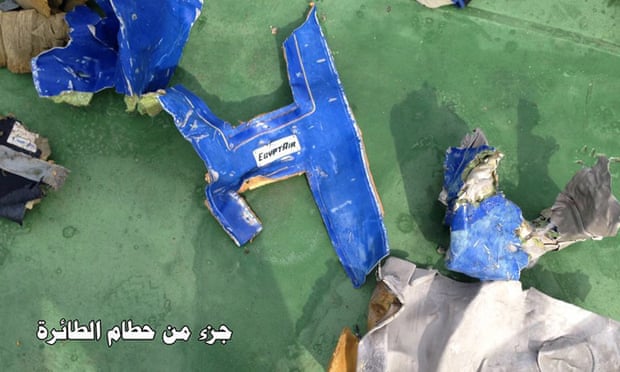EgyptAir flight MS804: smoke detected in 'multiple locations' before crash.
 |
| A picture posted on the Facebook page of the Egyptian armed forces spokesman shows part of the wreckage from EgyptAir flight MS804. Photograph: AP |
Smoke was detected in multiple places on board the missing EgyptAir flight MS804 minutes before it crashed, French investigators have confirmed, as the Egyptian military released pictures of the plane’s debris. Signs of smoke were picked up in a toilet and in the aircraft’s electronics, according to data from the Aircraft Communications Addressing and Reporting System (Acars), which routinely transmits data to airlines about the condition of their planes. As the search for the plane’s flight recorders continued, the Egyptian military released pictures of some the debris recovered on Friday. Photographs of a life vest, parts of the plane’s chairs and other wreckage were posted on Facebook. In France, investigators confirmed the data about smoke warnings that was first reported by the website Aviation Herald, while the French foreign minister Jean-Marc Ayrault said no theory on the cause of the crash has been ruled out. “At this time ... all theories are being examined and none is favoured,” he said after meeting with relatives of victims.
The warnings came at about 2.26am local time on Thursday, just before air traffic controllers lost contact with the plane, which plunged into the Mediterranean killing all 66 on board during a scheduled flight from Paris to Cairo.
David Learmount, a consulting editor at Flight Global, said the data presented the beginning of a sequence of events that could be “the answer to what happened”, but he could not confirm whether the fire was triggered by an act of terrorism or an electrical fault. “There’s a report of smoke in the forward lavatory [and] a minute later there’s smoke in the avionics bay, which is very worrying; and then two minutes later the flight control computers, one after the other, start to fail,” Learmount told BBC Radio 4’s Today programme. “Now the question we are left with is did this start with an ordinary electrical fault, a short circuit which started a fire, or was the fire started deliberately with a small explosion or an incendiary device? “It could still be terrorism but it looks as if the aircraft went out of control because the controls were literally burning up. But we don’t know if it’s terrorism that started this or an electrical fault.”
Shaker Kelada, the former head of Egypt’s plane crash investigations unit, cautioned against reading too much into the data. “Alone, it means nothing. It’s the last four seconds at the end of the transmission. If it’s an indication of anything it could be a followup to an explosion. It could also happen if someone smokes in the cockpit or the bathroom. But there was no warning in the cockpit. “This could be the first indication of a bomb. Or it can be unrelated. Since we don’t have any further information we cannot tell anything.” Greece’s lead air accident investigator Athanasios Binis said on Saturday that the search had been narrowed to a 900-square mile area, approximately 290km north of Alexandria. “That is where we are focusing and the sea there is between 7,500-10,000ft deep. Our priority, now, is to find the black boxes and as much wreckage as possible.” Investigators were still unclear whether the plane’s sudden drop in altitude was controlled or not, he added. “We still don’t know how it dropped from 37,000ft to 15,000ft or whether the pilot had tried to control it. It seems that they had a series of technical malfunctions before they lost control but what caused that we have yet to discover.”
The passengers included 30 Egyptians, 15 French citizens, two Iraqis, two Canadians, and citizens from Algeria, Belgium, Britain, Chad, Portugal, Saudi Arabia and Sudan. They included a boy and two babies. Seven crew members and three security personnel were also on board.
Ayrault, who was joined by Egypt’s ambassador to France at the meeting with passengers’ relatives on Saturday, said: “I strongly emphasised the desire of the French authorities to tell the entire truth about what happened. It’s a legitimate and essential expectation for all the families.” The meeting took place “in a climate of intense emotion and great dignity,” he said. Ayrault said finding the plane was a priority, along with finding black box recorders. A spokesman for France’s Bureau of Investigations and Analysis told AFP on Saturday: “There were Acars messages emitted by the plane indicating that there was smoke in the cabin shortly before data transmission broke off.”
The spokesman said it was “far too soon to interpret and understand the cause of Thursday’s accident as long as we have not found the wreckage or the flight data recorders”. The plane had taken a normal course through Greek airspace before abruptly taking sharp turns. The plane crashed at about 2.30am local time on Thursday while carrying 56 passengers, including Briton Richard Osman, and 10 crew. All those on board died. Despite theories that a bomb may have been smuggled on board, no claim of responsibility has so far been made by Islamic State or other terrorist groups.
source: www.theguardian.com
No comments:
Post a Comment